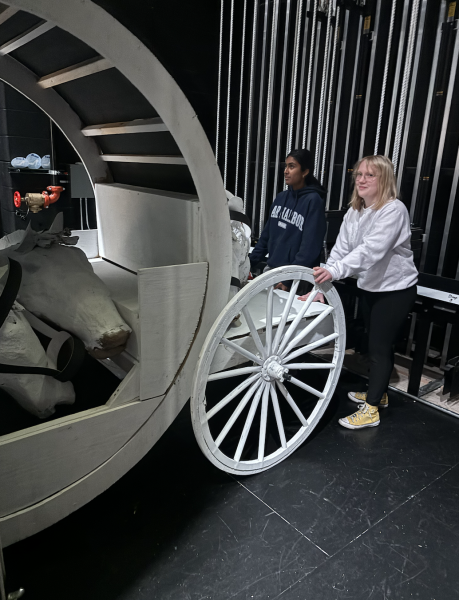Revere students get exposure to world languages
Senior Tyler Cai and junior Victoria Deng both feel a strong connection to their Chinese heritage. Both of Cai and Deng’s parents were born in China and lived there for the beginning of their lives. They endeavor to expose their children to their heritage in order to raise awareness to the opportunities that they have to combine experiences from a multicultural heritage to create a broader outlook.
Cai and Deng, students at Revere High School, represent a minority of Chinese speaking students in the junior and senior classes. Both learned to speak Chinese as their primary language as they grew up in Chinese speaking environments.
Cai commented on his reliance on Chinese in his day to day life.
“I speak a mix of Chinese and English at home on a regular basis,” Cai said.
Deng also talked about how much she uses Chinese in her life as a means to connect to her heritage.
“I mainly use it when I am around Chinese people, especially adults,” Deng said.
Deng commented on how Chinese helps her on a daily basis as it is a means to connect to her heritage.
“I do not have the opportunity to speak it daily. However it makes communication easy with older Chinese people who do not speak English fluently,” Deng said.
Cai also explained the advantages of speaking Chinese.
“I can speak another language. The main superpowers are going to be America and China, and I can understand and speak both of those languages fluently. I believe that this gives me a significant edge in being able to compete for jobs and other resources,” Cai said.
Deng’s mother, Wei Lin Deng, expounded on some of the differences between Chinese and English.
“There are no add-ons to words like the ‘s’ in cows for plural but just more words. The grammar is very different. I could go on but the list would be too big,” Wei Lin said.
Cai expressed why Chinese is difficult compared to western languages.
“Chinese is not phonetic, it doesn’t have an alphabet, and the way the tongue has to move to pronounce the different words are incredibly difficult for a non-native speaker,” Cai said.
Deng voiced her opinion on the difficulty of learning Chinese to a non-native speaker.
“Everyone has heard that Chinese is hard because of the huge number of characters one has to learn, and this is absolutely true. Some people say things like ‘Despite the fact that the Chinese language has 50,000 separate characters you really only need 2,000 or so to read a newspaper.’ This is not true because of the massive vocabulary,” Deng said.
Cai explained how the different dialects of Chinese, Mandarin and Cantonese contrast.
“The primary difference is in pronunciation, where Cantonese is usually referred to as having six stresses and Mandarin four. A stress is the emphasis on different syllables which alters the meaning of the word. Also, some of the words are just said differently between the dialects, similarly to how American English may differ from British English,” Cai said.
Deng gave a specific example of the difference of the pronunciation differences between the Cantonese and Mandarin dialects.
“Different pronunciations of seemingly the same word also affect the meaning. Rén means person and rèn means recognize,” Deng said.
Deng discussed the difficulty of writing Chinese compared to other languages.
“Chinese is difficult to write because it is not linked to any phonetic spelling or alphabet and instead uses pictorial symbols that range from a single line to very complex characters that must be individually learned. Each character can represent a single word or a phrase,” Deng said.
Deng also expressed the difficulty of transitioning between languages.
“There is no frame of reference going from English to Chinese like there is going from English to Spanish or other Western-style languages. There is no real sentence structure like adjective-noun, verb-noun that one would be used to in the traditional sense,” Deng said.
Deng discussed additional difficulties in learning to write Chinese.
“A ‘sentence’ in English can be easily condensed to a 4-5 character phrase in Chinese. Individual characters do not stand for phrases all the time, but it depends on what the speaker is trying to say,” Deng said.
Cai and Deng both learned to speak Chinese at a young age in a Chinese only environment. Although Cai has been to China twice and Deng has never been, both feel a strong connection to their Chinese culture due to their ability to speak the language of their ancestors.










